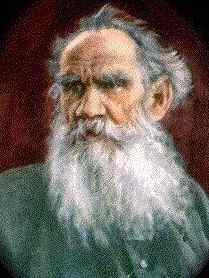Great Throughts Treasury
This site is dedicated to the memory of Dr. Alan William Smolowe who gave birth to the creation of this database.

Leo Tolstoy, aka Count Lev Nikolayevich Tolstoy or Tolstoi
Russian Essayist, Realistic Fiction Novelist and Playwright, best known for novels "War and Peace" and "Anna Karenina"
"The stronger the infection, the better is the art as art, speaking now apart from its subject matter, i.e., not considering the quality of the feelings it transmits. And the degree of the infectiousness of art depends on three conditions: (1) On the greater or lesser individuality of the feeling transmitted; (2) on the greater or lesser clearness with which the feeling is transmitted; (3) on the sincerity of the artist, i.e., on the greater or lesser force with which the artist himself feels the emotion he transmits."
"Therefore this third condition ? sincerity ? is the most important of the three. It is always complied with in peasant art, and this explains why such art always acts so powerfully; but it is a condition almost entirely absent from our upper-class art, which is continually produced by artists actuated by personal aims of covetousness or vanity."
"Thus is art divided from that which is not art, and thus is the quality of art as art decided, independently of its subject matter, i.e., apart from whether the feelings it transmits are good or bad."
"Lamenting the growing perversion of the art world, which has warped our ability to tell good art from bad, Tolstoy insists that the only way to distinguish true art from its counterfeit is by this very notion of infectiousness:"
"The activity of art is based on the fact that a man, receiving through his sense of hearing or sight another man?s expression of feeling, is capable of experiencing the emotion which moved the man who expressed it. ? And it is upon this capacity of man to receive another man?s expression of feeling and experience those feelings himself, that the activity of art is based."
"Such are the three conditions which divide art from its counterfeits, and which also decide the quality of every work of art apart from its subject matter."
"The chief peculiarity of this feeling is that the receiver of a true artistic impression is so united to the artist that he feels as if the work were his own and not someone else?s ? as if what it expresses were just what he had long been wishing to express. A real work of art destroys, in the consciousness of the receiver, the separation between himself and the artist ? not that alone, but also between himself and all whose minds receive this work of art. In this freeing of our personality from its separation and isolation, in this uniting of it with others, lies the chief characteristic and the great attractive force of art."
"The more individual the feeling transmitted the more strongly does it act on the receiver; the more individual the state of soul into which he is transferred, the more pleasure does the receiver obtain, and therefore the more readily and strongly does he join in it."
"The presence in various degrees of these three conditions ? individuality, clearness, and sincerity ? decides the merit of a work of art as art, apart from subject matter. All works of art take rank of merit according to the degree in which they fulfill the first, the second, and the third of these conditions. In one the individuality of the feeling transmitted may predominate; in another, clearness of expression; in a third, sincerity; while a fourth may have sincerity and individuality but be deficient in clearness; a fifth, individuality and clearness but less sincerity; and so forth, in all possible degrees and combinations."
"To evoke in oneself a feeling one has once experienced, and having evoked it in oneself, then, by means of movements, lines, colors, sounds, or forms expressed in words, so to transmit that feeling that others may experience the same feeling ? this is the activity of art."
"The clearness of expression assists infection because the receiver, who mingles in consciousness with the author, is the better satisfied the more clearly the feeling is transmitted, which, as it seems to him, he has long known and felt, and for which he has only now found expression."